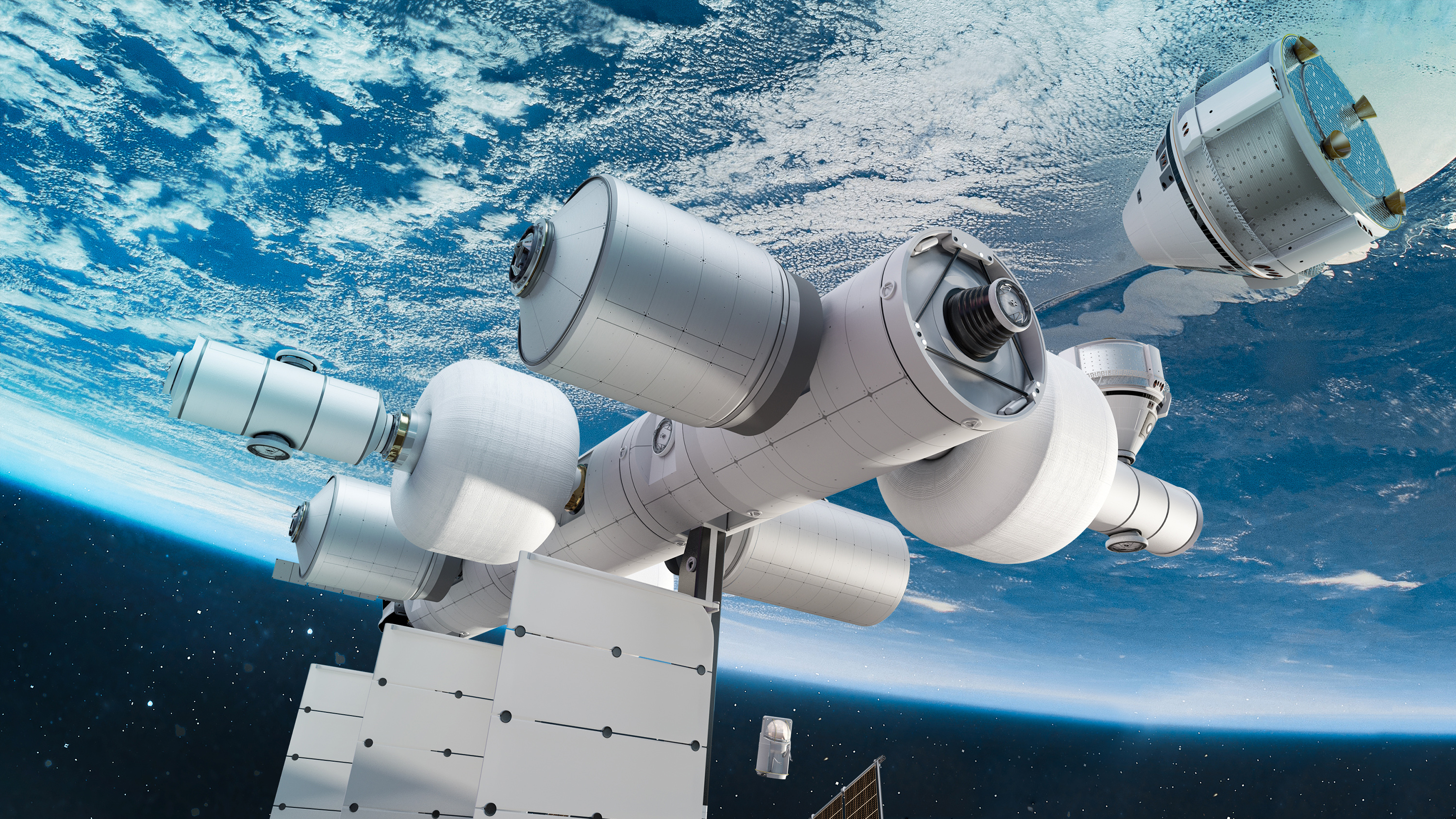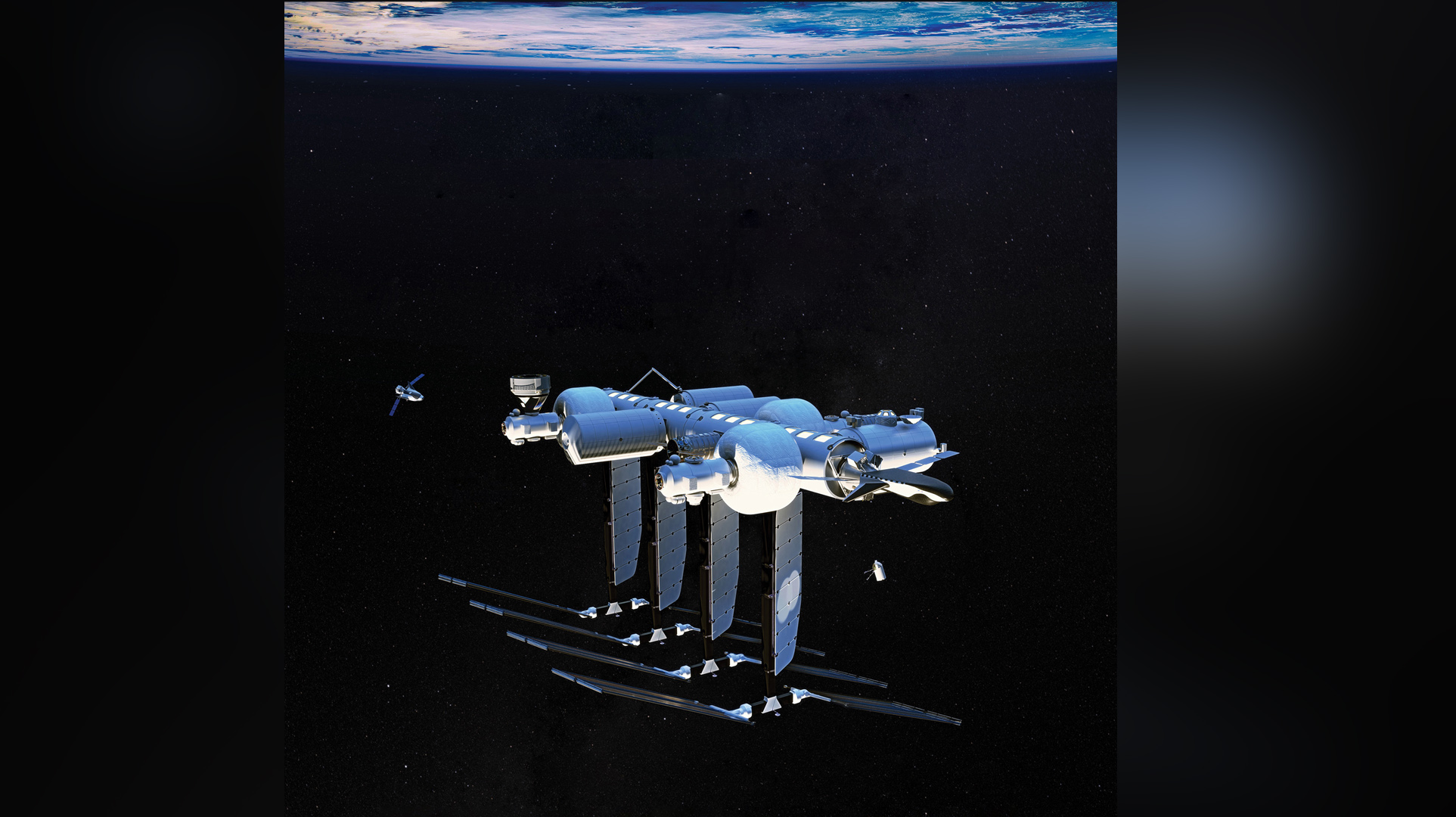Amazon joins Orbital Reef commercial space station project
Amazon's fulfillment and web services divisions are headed to the final frontier.

COLORADO SPRINGS, Colo. — Amazon is getting into the private space station business.
The company founded by billionaire Jeff Bezos has joined the Orbital Reef commercial space station project to provide supply-chain logistics and Amazon Web Services for the private orbital outpost, which is slated to launch by the late 2020s. The Orbital Reef project is led by Blue Origin (another company founded by Bezos) and Sierra Space, and is a partnership with Boeing, Redwire Space, Genesis Engineering and Arizona State University.
Amazon's role in Orbital Reef, which the company announced Tuesday (April 5) at the 37th National Space Symposium here, includes overseeing logistics using its Distribution and Fulfillment Solutions arm. And Amazon Web Services will offer networking, cloud computing and communications solutions for the station's fight operations, development and design teams.
"We are excited to collaborate with the Orbital Reef team to reimagine logistics for space," Brett McMillen, director of strategic partners for Amazon Distribution and Fulfillment Solutions, said in a statement. "Amazon looks forward to sharing our expertise in logistics and end-to-end supply chain infrastructure to help develop reliable infrastructure that ensures humans have the resources they need to explore, experiment and sustain long-term habitation in low Earth orbit."
Related: NASA wants to help private space stations get off the ground
Announced in October 2021, the Orbital Reef commercial space station is a collaborative project by Blue Origin, Sierra Space, Boeing and others (including, now, Amazon) to develop a private space station that can be used for a wide variety of commercial applications. Among those potential uses are commercial research and manufacturing, space tourism and media and entertainment projects, its backers have said.
The initial Orbital Reef design calls for a baseline configuration that will offer 29,311 cubic feet (830 cubic meters) of pressurized volume and be able to support up to 10 people at a time.
Blue Origin will contribute large-diameter modules and use its New Glenn heavy-lift rocket to launch components into orbit. Boeing will oversee Orbital Reef operations and maintenance, provide some science modules and use its Starliner spacecraft to ferry astronauts to and from the station. Boeing already has a NASA contract to fly astronauts to the International Space Station (ISS) with Starliner, too.
Breaking space news, the latest updates on rocket launches, skywatching events and more!
Sierra Space will build expandable Large Integrated Flexible Environment (LIFE) modules to serve as living quarters for astronaut crews. Its Dream Chaser space plane (which NASA has tapped for ISS cargo delivery flights) may also fly cargo and crews to the Orbital Reef.

Meanwhile, Redwire Space will develop solar arrays for the commercial space station while Genesis Engineering Solutions will build a single-person spacecraft for personal "spacewalks" outside. Arizona State University will lead a 14-university consortium to provide research advice and outreach.
The initial Orbital Reef station is envisioned to include a core module, LIFE module, science module, Genesis spacecraft and power system, Blue Origin has said.
"Orbital Reef is applying proven approaches to enable a robust business ecosystem in low Earth orbit," said Brent Sherwood, Blue Origin's senior vice president of advanced development programs, in a statement, in which he hailed new partners Amazon and AWS. "We're working with the world's best to reimagine logistics for a commercial mixed-used space business park."
Email Tariq Malik at tmalik@space.com or follow him @tariqjmalik. Follow us @Spacedotcom, Facebook and Instagram.

Tariq is the award-winning Editor-in-Chief of Space.com and joined the team in 2001. He covers human spaceflight, as well as skywatching and entertainment. He became Space.com's Editor-in-Chief in 2019. Before joining Space.com, Tariq was a staff reporter for The Los Angeles Times covering education and city beats in La Habra, Fullerton and Huntington Beach. He's a recipient of the 2022 Harry Kolcum Award for excellence in space reporting and the 2025 Space Pioneer Award from the National Space Society. He is an Eagle Scout and Space Camp alum with journalism degrees from the USC and NYU. You can find Tariq at Space.com and as the co-host to the This Week In Space podcast on the TWiT network. To see his latest project, you can follow Tariq on Twitter @tariqjmalik.
